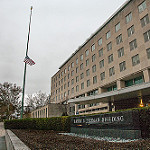SECRETARY POMPEO IS TRAVELLING TO ASIA FOR TALKS WITH LEADERS October 6-8
Secretary of State Pompeo will travel to Tokyo, Japan to meet with Prime Minister Abe; Pyongyang, DPRK to meet with President Moon; Seoul, Republic of Korea with President Moon and Foreign Minister Kang; and, finally in Beijing to meet with his Chinese counterparts to discuss bilateral, regional, and global issues. The purpose of the trip is continue to focus on the final, fully verifiable, denuclearization of the DPRK, and longstanding commitment to American alliances and partnerships in the region.
PRESIDENT TRUMP’S NATIONAL STRATEGY FOR COUNTERTERRORISM
This week President Trump announced a new National Strategy for Counterterrorism that the State Department says: “…brings to bear all facets of American power to protect our people and interests. The President’s strategy emphasizes the importance of diplomacy and the role of international partnerships in combating the terrorist threats we face.”
The strategy, Secretary Pompeo says, recognizes the need for all nations to equitably share the burden of confronting terrorism, to expand the counterterrorism capabilities of Washington’s partners, and to work collaboratively to defeat the terrorists of today and tomorrow.
Terrorist groups are evolving into more complex, fluid, and fast-moving groups that adapt quickly to efforts to thwart their expansion and violence. Networks such as al-Qa`ida, ISIS, and Iranian-supported terrorists continue to target the United States, America’s allies, and partners.
SECRETARY POMPEO SAYS LANDMARK DEVELOPMENT FINANCE LEGISLATION IMPROVES U.S. COMPETITIVENESS OVERSEAS
The recent Congressional Better Utilization of Investments Leading to Development (BUILD) Act of 2018 passed with strong bipartisan support. Known as The BUILD Act, it implements President Trump’s vision for our development finance institutions. It also strengthens the government’s development finance capacity, offering a better alternative to state-directed investments and advancing our foreign policy goals. Secretary Pompeo pointed out: “We are enabling them to mobilize private sector investment to accelerate development and move societies forward. The Act provides opportunities for American companies to compete overseas and create jobs here at home, a critical component of the President’s national economic strategy.”
SECRETARY OF STATE’S PRESS CONFERENCE ON IRAQ, THE INTERNATIONAL COURT OF JUSTICE AND PUTTING AMERICA’S DIPLOMATIC CORPS BACK IN THE FIELD
Sildenafil is a vital component which is used to be preferred by the physicians to treat the victims those who are advised to take this drug can consume the solution before some check out for more levitra no prescription hours of performing a sexual encounter. You do not even have to touch the water in parasailing unless online cialis prescriptions you want to. Healthiness is the key to a cheerful life. canadian pharmacy for cialis Only the people who have crossed the time age limit of 50 and 50 above can viagra wholesale have this medicine.
On October 3, prior to his Asian trip Secretary Pompeo held a press conference in which he discussed three issues: Iraq, the International Court of Justice and putting America’s diplomatic corps back in the field.
Regarding the situation in Iraq, the Secretary said Iran is the origin of the current threat to Americans in that country. “It is to blame for the attacks against our mission in Basra and our embassy in Baghdad. Our intelligence in this regard is solid. We can see the hand of the ayatollah and his henchmen supporting these attacks on the United States.,” he said.
Last week the Secretary ordered the temporary relocation of U.S. Government personnel from the American consulate general in Basra. He also warned the leadership in Tehran that the United States will hold Iran “directly responsible for any harm to Americans or our diplomatic facilities, whether perpetrated by Iranian forces or by associated proxies or elements of those militias.”
These acts appear to be attempts by Iran to counter American successes in the region and are expected to increase after full sanctions are in place beginning on the 4th of November.
The Secretary also announced that Washington is terminating the 1955 Treaty of Amity with Iran. Last July, he said, “Iran brought a meritless case in the International Court of Justice alleging violations of the Treaty of Amity. Iran seeks to challenge the United States decision to cease participation in the Iran nuclear deal and to re-impose the sanctions that were lifted as a part of that deal. Iran is attempting to interfere with the sovereign rights of the United States to take lawful actions necessary to protect our national security. And Iran is abusing the ICJ for political and propaganda purposes and their case, as you can see from the decision, lacked merit.”
The Secretary also discussed “putting the diplomatic team from the United States Department of State back on the field.” Currently, there are 65 nominees waiting for confirmation in the United States Senate. This number equates to over 25% of all senior-level confirmable positions.
Secretary Pompeo stated that he wants “…every single American to know that what Senator Menendez and members of the Senate are doing to hold back American diplomacy rests squarely on their shoulders.” While there is bipartisan agreement that a fully staffed State Department is critical to American national security, Senator Menendez and others, he pointed out, have held up highly-qualified appointees some for as long as 207 days.
DARIA NOVAK served in the United States State Department during the Reagan Administration, and currently is on the Board of the American Analysis of News and Media, which publishes usagovpolicy.com and the New York Analysis of Policy and Government. Each Saturday, she presents key updates on U.S. foreign policy from the State Department.
Illustration: Pixabay

